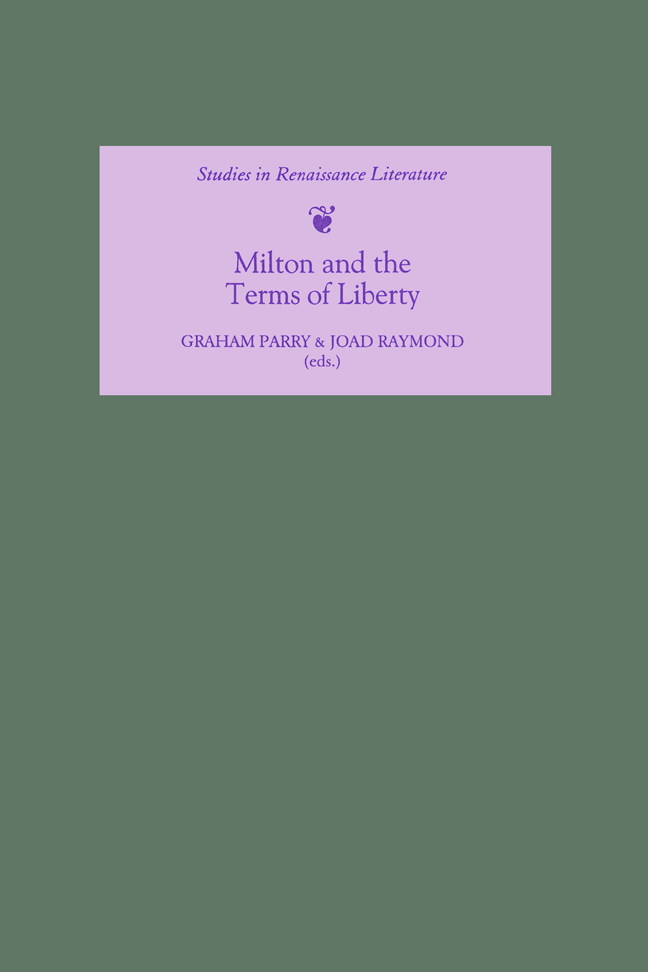Book contents
- Frontmatter
- Contents
- Contributors
- Acknowledgements
- Introduction
- 1 John Milton and the Politics of Slavery
- 2 Milton before ‘Lycidas'
- 3 Prosody and Liberty in Milton and Marvell
- 4 'In These Western Parts of the Empire': Milton and Roman Law
- 5 The King is a Thing
- 6 'in time of Warre … our Language is all corrupt with military Tearms': The Politics of Martial Metaphors in Post-regicide England
- 7 Alexander More Reads Milton: Self-representation and Anxiety in Milton's Defences
- 8 Stylometry and the Provenance of De doctrina christiana
- 9 The Figure and the Ground: Samson as a Hero of London Nonconformity, 1662-1667
- 10 The Publication of the King's Privacy: Paradise Regained and Of True Religion in Restoration England
- 11 'To try, and teach the erring Soul': Milton's Last Seven Years
- 12 Pandemonic Panoramas: Surveying Milton's ‘vain empires’ in the Long Eighteenth Century
- Index
- Studies in Renaissance Literature
12 - Pandemonic Panoramas: Surveying Milton's ‘vain empires’ in the Long Eighteenth Century
Published online by Cambridge University Press: 15 February 2024
- Frontmatter
- Contents
- Contributors
- Acknowledgements
- Introduction
- 1 John Milton and the Politics of Slavery
- 2 Milton before ‘Lycidas'
- 3 Prosody and Liberty in Milton and Marvell
- 4 'In These Western Parts of the Empire': Milton and Roman Law
- 5 The King is a Thing
- 6 'in time of Warre … our Language is all corrupt with military Tearms': The Politics of Martial Metaphors in Post-regicide England
- 7 Alexander More Reads Milton: Self-representation and Anxiety in Milton's Defences
- 8 Stylometry and the Provenance of De doctrina christiana
- 9 The Figure and the Ground: Samson as a Hero of London Nonconformity, 1662-1667
- 10 The Publication of the King's Privacy: Paradise Regained and Of True Religion in Restoration England
- 11 'To try, and teach the erring Soul': Milton's Last Seven Years
- 12 Pandemonic Panoramas: Surveying Milton's ‘vain empires’ in the Long Eighteenth Century
- Index
- Studies in Renaissance Literature
Summary
WHEN the archangel Raphael, conversing with Adam, attempts to accommodate the dimensions of the heavenly courts to human categories, he describes them as ‘wider far/ Than all this globous earth in plain outspread’ (PL 5.648-9). Richard Bentley in 1732 objects that this comparison cannot but ‘puzle’ Adam, who is not informed about ‘the Length of the Earth's Diameter’ – Raphael is telling ‘affected Stuff, like some boasting Traveller'. Throughout his commentary, Bentley declares his fictitious ‘Editor’ responsible for such ‘boasting’ passages; but while here the boasting allegedly results in opacity, on other occasions Bentley reprehends the ‘Editor’ for reiterating ‘obvious’ knowledge. Thus ad Book 11, Bentley has ironic praise for Michael's enumeration of future empires: ‘very useful, if he was explaining to a young Boy a Sheet-Map of the World'. Bentley especially complains about the specificit y of the enumeration, which differentiates between native American and Spanish designations for certain regions – Milton himself, he is convinced, would have handled this passage much more summarily, ‘[contenting) himself with Continents, Seas, Islands, Terrasque tractusque maris … But our Editor would not lose the good occasion to shew his Geographic Skill, that he had perus'd a Sixpenny Map.’ Here Bentley is dismissive of detailed geographical descriptions because, unlike Adam or Milton's contemporary audience, he has lost the sense of novelty about them.
Bentley's example, though distinguished by irascibility, is characteristic of eighteenth-century critical developments: most Milton commentaries of that epoch demonstrate a strong bias about what the text means in the light of their own times. Strong correlations exist between British imperial politics and eighteenth-century transformations of Milton's epics; an altered percep- tion of Milton's temporal-spatial categories is a crucial issue in that context. Pace Bentley, most eighteenth-century commentaries on Paradise Lost combine the summary survey and the detailed examination, celebrating the superior attainments of latter-day science and geography while summarily ‘spreading out’ the globe before mankind, turning prophecy into panorama. As John McVeagh observes, during that epoch ‘writers take on board the new perception of a reachable, intelligible, even familiar earth. Seeing the world in the round becomes commonplace… The new sense is of the wholeness and, despite its variety, the smallness of the globe.' Such visions facilitated conceptual access to and dominion over the globe.
- Type
- Chapter
- Information
- Milton and the Terms of Liberty , pp. 191 - 214Publisher: Boydell & BrewerPrint publication year: 2002

